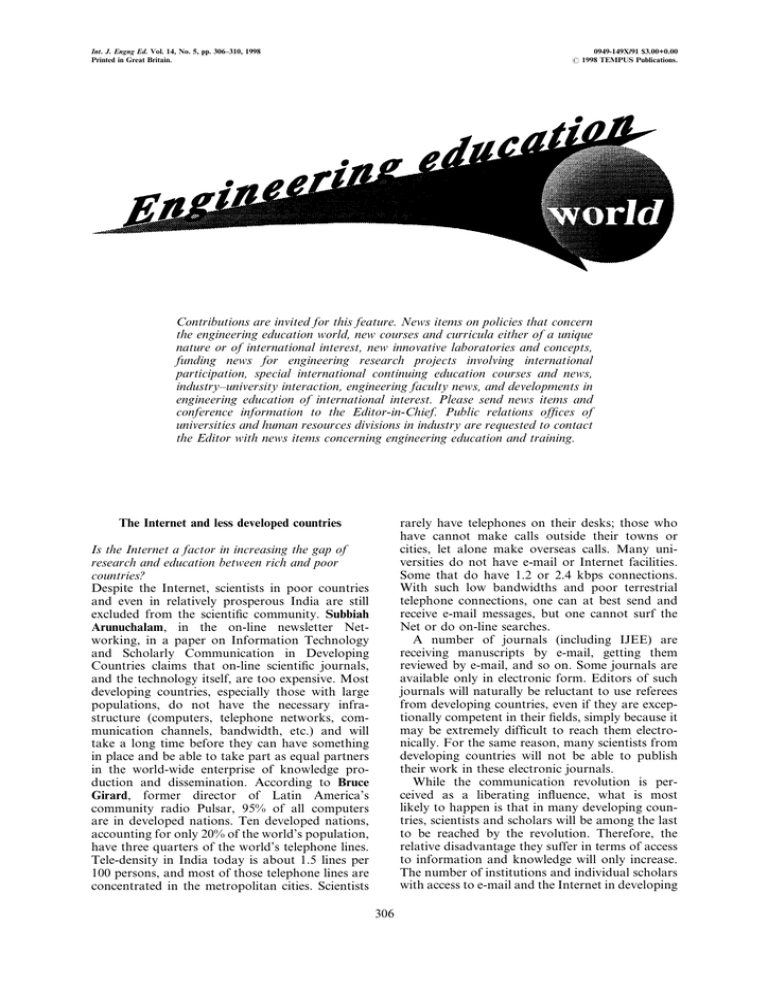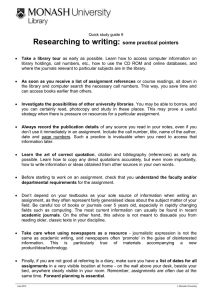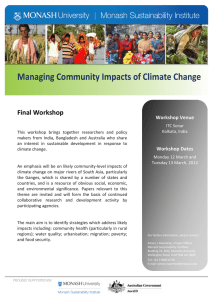Int. J. Engng Ed. Vol. 14, No. 5, pp. 306±310,... 0949-149X/91 $3.00+0.00 Printed in Great Britain. # 1998 TEMPUS Publications.
advertisement

Int. J. Engng Ed. Vol. 14, No. 5, pp. 306±310, 1998 Printed in Great Britain. 0949-149X/91 $3.00+0.00 # 1998 TEMPUS Publications. Contributions are invited for this feature. News items on policies that concern the engineering education world, new courses and curricula either of a unique nature or of international interest, new innovative laboratories and concepts, funding news for engineering research projects involving international participation, special international continuing education courses and news, industry±university interaction, engineering faculty news, and developments in engineering education of international interest. Please send news items and conference information to the Editor-in-Chief. Public relations of®ces of universities and human resources divisions in industry are requested to contact the Editor with news items concerning engineering education and training. rarely have telephones on their desks; those who have cannot make calls outside their towns or cities, let alone make overseas calls. Many universities do not have e-mail or Internet facilities. Some that do have 1.2 or 2.4 kbps connections. With such low bandwidths and poor terrestrial telephone connections, one can at best send and receive e-mail messages, but one cannot surf the Net or do on-line searches. A number of journals (including IJEE) are receiving manuscripts by e-mail, getting them reviewed by e-mail, and so on. Some journals are available only in electronic form. Editors of such journals will naturally be reluctant to use referees from developing countries, even if they are exceptionally competent in their ®elds, simply because it may be extremely dif®cult to reach them electronically. For the same reason, many scientists from developing countries will not be able to publish their work in these electronic journals. While the communication revolution is perceived as a liberating in¯uence, what is most likely to happen is that in many developing countries, scientists and scholars will be among the last to be reached by the revolution. Therefore, the relative disadvantage they suffer in terms of access to information and knowledge will only increase. The number of institutions and individual scholars with access to e-mail and the Internet in developing The Internet and less developed countries Is the Internet a factor in increasing the gap of research and education between rich and poor countries? Despite the Internet, scientists in poor countries and even in relatively prosperous India are still excluded from the scienti®c community. Subbiah Arunuchalam, in the on-line newsletter Networking, in a paper on Information Technology and Scholarly Communication in Developing Countries claims that on-line scienti®c journals, and the technology itself, are too expensive. Most developing countries, especially those with large populations, do not have the necessary infrastructure (computers, telephone networks, communication channels, bandwidth, etc.) and will take a long time before they can have something in place and be able to take part as equal partners in the world-wide enterprise of knowledge production and dissemination. According to Bruce Girard, former director of Latin America's community radio Pulsar, 95% of all computers are in developed nations. Ten developed nations, accounting for only 20% of the world's population, have three quarters of the world's telephone lines. Tele-density in India today is about 1.5 lines per 100 persons, and most of those telephone lines are concentrated in the metropolitan cities. Scientists 306 Engineering Education World countries and the rate at which this access has grown over time will support this contention. The speedy transition to electronic publishing will make it much easier for scientists in developed countries to interact with colleagues and members of their invisible colleges. The low level of information and communication technologies in developing countries will lead to the progressive exclusion of a majority of scientists in these countries from the collective international discourse that is essential for making progress in new knowledge production. Even now, when much publishing takes place in print, participation by India and other developing countries in high-impact journals such as Science, Cell, and the Journal of the American Chemical Society is very low. The already existing gulf in the levels of science performed in developed and poorer countries will be widened further, and that could lead to increased levels of brain drain and dependence on foreign aid of a different kindÐa new knowledge imperialism. Details: http://node.on.ca/networking/november 1998/feature2.html United Kingdom Engineering departments are threatened with closure At least two civil engineering departments at London universities face closure, with the loss of ®ve or more academic jobs. Falling student numbers in the subject and new regulations from the Engineering Council due next year have prompted the University of Westminster and Queen Mary and West®eld College to contemplate closure. Students at Westminster are considering legal action against the university for a possible breach of contractual agreements. At Queen Mary and West®eld, ®ve people have already been asked to accept voluntary redundancy. Neither university is recruiting to its courses next year and Westminster has held talks with a number of institutions in London to try to ®nd somewhere to transfer students in the middle of their studies. South Bank University, which lost 26 people through redundancies in the faculty of the built environment last summer, is said to be a main contender. Trish Richards, welfare and education of®cer at Westminster's student union, said: `Most of the students are up in arms. We have asked the university at least to let the course run out and, if not, to allow students to be fully involved in the decision-making process.' Staff are also concerned that their positions may be under threat. The department has just under six staff, which has shrunk from 11 in the past few years. They say the construction hall at Marylebone Road is a unique site that could be more pro®tably exploited for engineering. Geoffrey Copland, Westminister's vice-chancellor, said applications to study civil engineering had fallen steeply and could drop further following changes to be introduced by the 307 Engineering Council from next September. These will mean students studying for MEng degrees, leading to chartered status, will need stronger A-level results. `It was a hard decision but the economics of it no longer work,' he said. `Either we invest heavily in it or seek a way for students to complete their degree satisfactorily, which is the prime motivation in ®nding somewhere else.' A spokesman for Queen Mary and West®eld College said students from year one onwards would be able to continue their studies at the college. Germany The trend is to teach in English We have reported on a number of courses now running which are, at least in part, in English. It is thought that engineering students need to study in the language which has become the international communications Lingua Franca for all scientists and professionals. Moreover, with the increasing rejection by foreign students the authorities realise that the potential of cashing in on the international student market needs to be tapped. This has been seriously hampered by the requirements for foreign students to command the German language, and the non-equivalence of degrees due to incompatibility. The remedy is applied by teaching engineering courses in English and by granting B.Sc. and M.Sc. degrees. The dif®culties encountered are in the lack of German accreditation standards, and the insuf®cient training of students and academic staff to teach in a foreign language. In fact, the pro®ciency in English of both staff and students has improved immensely in recent years, nevertheless, the compounded dif®culties of complex learning materials in a foreign language are not easy to overcome. Foreign students, who until now spent years in preparing their German skills for acceptance at universities will in future only need to command `survival German'. There are warning voices that claim that scienti®c development is partly dependent on language culture and semantics. This is more true in the social sciences and humanities than in science and engineering, where terminology is generally compatible. Ireland Controversial higher-education policy The government of Ireland has been embarrassed by a document that paints a picture of a Cabinet divided over the issue of higher-education expansion. The memorandum, released last month under Ireland's new Freedom of Information Act, reported on a June Cabinet meeting at which the Minister for Finance, Charlie McCreevy, argued against a planned increase in student places. He said that to expand enrolment would cost too much and not be a wise investment, since he 308 Engineering Education World doubted there would be enough students to ®ll the extra places. Ireland is experiencing shortages of skilled workers in some high-tech areas, thanks to its booming economy. Last year, the government took several steps designed to ease employers' fears of serious labour shortages, including the establishment of an educational-technology investment fund. But the memo showed that the ®nance minister opposed a plan by the Minister for Education, Michael Martin, to build a new technology institute in a Dublin suburb. The education minister warned that the failure to proceed with the plan would send the wrong message to business and investors about the government's commitment to providing skilled workers. After some debate, Mr. Martin won out. Plans for the new institute are going forward. The decision to release the memo was made by a mid-level civil servant in the Department of Education in response to a request by the opposition Labour Party, which promptly turned the document over to a national newspaper. The publication of the article led to a ¯ap in the Cabinet and is likely to result in measures to ensure that Cabinet memos of recent origin are not of®cially released under the Freedom of Information Act. Italy Italy adds credits to university revolution Italian state universities are radically redesigning degree courses to harmonise with the rest of Europe and strengthen the drive to greater university autonomy. A three-year `foundation' degree based on credits will be introduced followed by further specialisation. The credit system will permit the creation of a common ®rst year for two or more degree courses, more cross-faculty teaching and courses. Higher education has been rigidly centralised, with degrees based on set exams and a thesis with little variation from one university to another. The principle of university autonomy, established a few years ago, in conjunction with a revamped degree structure, will allow each university to design courses on the basis of regional characteristics, student demand, collaboration with local ®rms, and competition between universities. `This is a radical revolution,' according to Luciano Guerzoni, under-secretary for universities. `Only those Italian universities that already have experience of international relations, through Socrates, Erasmus, and so on, have some familiarity with the credit system. `By 1999±2000 we hope to have both the credit system and the new architecture of the courses fully operational in all the state universities,' he added. Each university is free to design its degree courses, incorporating some compulsory national standards complete with rectors, academic and faculty councils.' Most rectors are enthusiastic that the new system will allow them much greater ¯exibility and the possibility of streamlining degree courses and reducing the massive drop-out rate and the extra years that most Italian students take to obtain a degree. But there is some resistance from the professors, who have been virtually free of any control, supervision, discipline or objective evaluation of their worth. `The new structure and credits system seeks to improve the ef®ciency of higher education,' said Professor Guerzoni. `Therefore each professor will have `x' credits for his course, which will be an objective measure of its importance within the degree program. A professor teaching a minor course, worth only a few credits, will no longer be able to impose huge essays and a very dif®cult, timeconsuming examination. `Lecturers are having to face the fact that the number of credits for a speci®c course is a measure of the workload of the student, not of the prestige of the academic teaching the course. USA Engineering student kills doctoral adviser during exam A graduate student at Wayne State University, frustrated with his poor academic performance, confessed to fatally shooting his doctoral adviser the night before in front of 11 students, according to university and police of®cials. Wlodzimierz Dedecjus, a graduate student in the Department of Electrical and Computer Engineering, shot Andrzej Olbrot twice with a ri¯e while the professor of electrical engineering was administering a ®nal exam to a graduate class. During the shooting, Mr. Dedecjus avoided pointing the gun at the students, none of whom were injured in the attack, according to Dallas Schneider, a public safety of®cer at Wayne State. Only a few hours later, Mr. Dedecjus walked into the Ann Arbor, Mich., police headquarters and confessed to the killing, according to a university press release. Police were trying to determine what prompted the shooting. Mr. Dedecjus did poorly this past semester in an independentstudy course he was taking with Mr. Olbrot, his adviser, said Louis A. Lessen, the university's vice-president and general counsel. Mr. Dedecjus's poor performance appeared to be a source of frustration to both the student and his adviser. According to reports in the Detroit Free Press, Mr. Olbrot's ex-wife, Margaret Parker-Olbrot, said that Mr. Olbrot had referred derisively to Mr. Dedecjus's poor performance. `He could not work with him because he was too slow,' she said. Irvin D. Reid, the university's president, expressed sorrow about the incident. `We are obviously at a time in the country when events like this come upon us, and university campuses are no exception,' he said. Engineering Education World Australia Monash on overseas expansion track Monash University in Melbourne is believed to be the ®rst university to begin developing offshore education programs that will be offered across the entire region of southern Africa. University of®cials have held discussions with education ministers from the 14 member countries of the Southern African Development Community and are preparing detailed briefs for approval. The ®rst programme is expected to be in place by the middle of next year, while a full branch campus of Monash will be operating, probably in Johannesburg, by 2000. This will be followed by the establishment of a range of satellite bases in the other countries in the region. Monash has been very active in establishing external engineering education facilities. Monash vice-chancellor David Robinson said the aim was to have a `distributed network' of education programmes and activities delivered in collaboration with local education providers and established universities. Professor Robinson met SADC education ministers in Paris prior to the Unesco conference on higher education. He said Monash's `concept plan' had been warmly received and followed discussions between governments in the region and the executive director of the university's international programs, Ian Porter. Monash is investigating registration requirements as a foreign education provider within the various nations, focusing initially on South Africa, where the government has drafted a Private Higher Education Institutions Act similar to one in place in Malaysia. Monash became the ®rst foreign university to gain a licence from the Malaysian government in 1988 to set up a branch campus in Kuala Lumpur. The campus opened in July with 450 students and 2,000 are expected to be enrolled by November next year. Professor Robinson said no other foreign universities operating within the SADC countries had adopted a strategic approach to education provision as broad as the Monash initiative. `We want to identify an activity in each country that would be to their bene®t: it could be an access program in Mozambique, or a distance-education portfolio in Zimbabwe, where there is an excellent but small university and a large well-quali®ed secondary school population,' he said. `We are looking at where we can make a contribution: bridging courses, for example, to help students who might not otherwise get access to universityÐa whole portfolio of programs we could do in a distributed way but headed by the one organisation,' Robinson said. African students will pay fees on a cost-recovery basis but will be offered bursaries and scholarships so that at least some of their costs can be met. 309 Women outnumber and outperform men Women now far outnumber men among university students in Australia and are also much more successful academically. A report commissioned by the Australian vice-chancellor's Committee found that 56 per cent of students at the country's universities now are female, and that the women are outperforming men in almost every discipline. Nationwide, the pass rate among women in the ®rst year of university studies is 80 per cent, compared with 72 per cent for men. The study compared enrolment trends and the performance of ®rst-year students from 1993 to 1996. It also looked at the academic performance of foreign students and those enrolled in distance-learning programs. The overseas students, on average, were found to do better academically than their Australian counterparts, particularly in the arts, business, engineering, and science. Distanceeducation students, however, were not nearly as successful as those studying on a campus. While 83 per cent of on-campus students completed their ®rst year successfully, the ®gure for those in distance-learning programs was only 65.5 per cent. Students are set same exam two years running Sitting among his 500 peers at the University of Melbourne, the computing engineering student gazed at the ®nal examination paper in horror. `Oh God!' he muttered. `This is just like the exam I failed last year' In fact, it was exactly the same paper: the 1997 examination paper had been reprinted and handed round to this year's crop of examinees. Some students saw the date on the front cover and thought it was a misprint. Others were thrilled: these were the same questions they had just been answering as part of their revision for the course. However, their delight was shortlived. To their fury, other students raised their hands to enquire about the date. When the error was pointed out, there was a dreadful silence while staff investigated. Then it was announced the exam had been cancelled and would have to be held again. An embarrassed university spokeswoman denied that reissuing old exam papers was a novel method of saving money or that the mistake was ever likely to be repeatedÐcertainly not in computing engineering. Mexico Sharp university budget cuts caused by slumping oil prices Mexico's proposed federal budget for 1999 would effectively freeze almost all programs at the National Autonomous University of Mexico, the country's largest, and bring about signi®cant cuts at other public institutions across the country. The government, which gets about 35 per cent of its revenue from oil sales, is proposing an extremely austere budget for 1999 because the price of oil recently has plummeted to historically low levels. 310 Engineering Education World Since the National University, known as UNAM, receives 90 per cent of its operating funds from the government, educators fear that a budget cut would force the institution to ®re faculty members, halt construction projects already in progress, freeze research projects, and reduce enrolment. Because faculty salaries account for 65 per cent of the university's budget, they would probably be trimmed, even though they now average only about $3 an hour. Conferences CAL 99 Virtuality in Education 28±31 March 1999 The Institute of Education, London, UK. Contact: Phillipa Orme, 12 Church St, Wantage OX12 0LN, UK Tel: 44 1235 868811 e-mail: p.orme@dial.pipex.com http://www.elsevier.nl/locate/cal99 10th International Conference on College Teaching and Training 14±17 April 1999 Jacksonville FL, USA Contact: Bill Martin Tel: 1 904 646 2150; Fax: 1 904 646 21880 e-mail: wmartin@fccj.org http://www.fccj.cc.¯.us/conf/ 4th European Forum for Continuing Engineering Education 9±11 June 1999 Trondheim, Norway Contact: Mary Saeterbakk, SEVU Congress Department Tel: 47 7359 5669; Fax: 47 7359 5150 e-mail: mari.saterbakk@sevu.ntnu.no http://www.ntnu.no/sevu/4thforum American Society for Engineering Education Annual Conference 20±23 June 1999 Charlotte NC, USA Contact: Dyanne Hughes 1818 N. St. NW, Washington, DC 20036, USA. Tel: 1 202 331 3522 e-mail: d.hughes@asee.org http://asee.org Meet '99 Maritime Engineering Education and Training 21±24 June 1999 St Petersburg, Russia Contact: Kirill Rozhdestvensky, St Petersburg State Marine University, 3 Lotsmanskaya, St Petersburg, Russia. Fax: 7 812 219 5227 e-mail: xmas@infopro.spb.su




